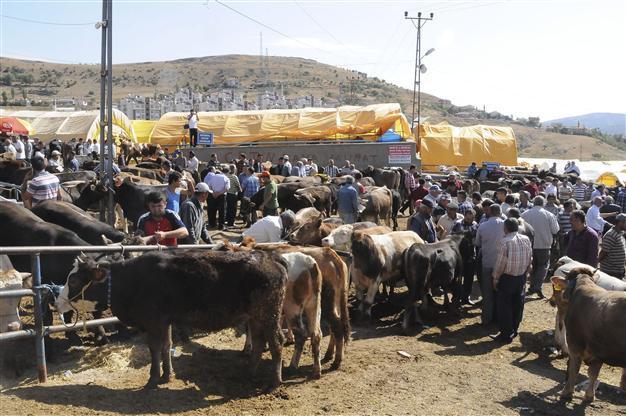World Muslims set to celebrate Feast of Sacrifice
ISTANBUL

AA Photo
Muslims worldwide, including those in Turkey, are set to celebrate Islam’s holy Feast of Sacrifice – known as Eid al-Adha in Arabic - with millions of Muslims across the world making a pilgrimage this week to Saudi Arabia.
The four-day celebration begins on Sept. 24 in Turkey and most other countries with a predominantly Muslim population.
Large numbers of sacrificial animals, including sheep, cows, goats and camels will be killed as part of the Feast of Sacrifice and their meat will be distributed to the poor as a religious tradition in Islam.
This year Turkey declared a nine-day public holiday starting from Sept. 19 for the Feast of Sacrifice.
Public employees would be granted leave on Sept. 21, 22, and a half day on Sept. 23, the Prime Ministry’s Press Office said in a written statement.
“All employees working at public institutions will be on leave for the whole day on Sept. 21 and 22, and half day on Sept. 23, as long as administrative officials keep sufficient personnel on duty so as to not cause a halt to the usual workflow,” it said.
While most Turkish Muslims make good on their religious duties by sacrificing livestock and distributing the meat to the poor, a considerably large number of them prefer to instead spend their time off during the holiday vacationing.
Hundreds of thousands of Turks traditionally travel to their hometowns to spend time with their families during the holiday, which has in recent years seen increased traffic accidents across the country due to mass traveling.
Meanwhile, more than 2 million Muslims coming from across the world started on Sept. 22 the first rites of the annual hajj in Saudi Arabia, one of the world’s largest pilgrimages which draws millions to the holy city of Mecca for rituals and prayers, Associated Press reported.
One of the rituals is for pilgrims to circle the Kaaba, the black cubic structure in Mecca’s Grand Mosque. In a sign of humility and equality before God, the pilgrims shed symbols of materialism, entering a state of “ihram.” Women forgo makeup and perfume and wear loose-fitting clothing and a head covering, while men are dressed in seamless, white terrycloth garments.
Islam requires all able-bodied Muslims to perform the hajj at least once. The pilgrimage is among the five main pillars of Islam, which also includes belief in the oneness of God and the Prophet Muhammad as his final messenger, five daily prayers facing toward the Kaaba, annual charity and fasting during the month of Ramadan.
The pilgrimage requires money, physical perseverance and a coveted hajj visa. Saudi Arabia has strict quotas for each country to manage crowd safety.
The main day of hajj this year falls on Sept. 23, when 2 to 3 million people will be packed shoulder to shoulder in prayer in a valley called Arafat, said to be the site where the Prophet Muhammad delivered his final sermon some 1,400 years ago, calling for equality and unity among Muslims.
In Islamic faith, the Feast of Sacrifice, on the other hand, is celebrated to commemorate the Prophet Abraham’s willingness to sacrifice his son Ismail - the Biblical Ishmael, though Christians and Jews believe his other son Isaac was the near-sacrifice - as a test of his faith in God.
In remembrance, Muslims worldwide sacrifice sheep and other livestock and give their meat to the poor.
